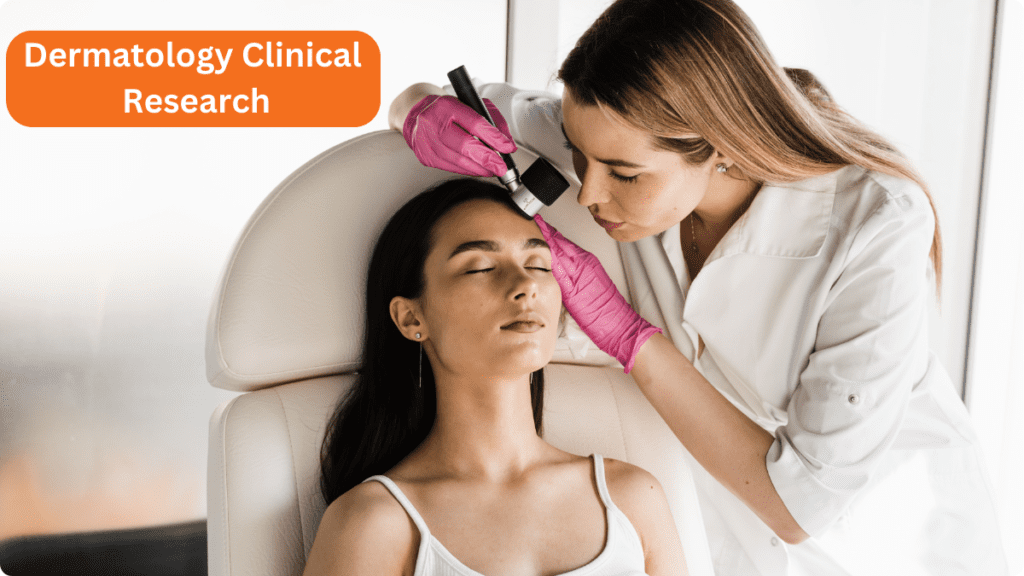Dermatology clinical research is revolutionizing the way we comprehend and treat different skin ailments. From acne to serious dermatological conditions, ongoing developments in dermatology research have opened doors to new treatments. Researchers and specialists are continuously striving to create effective solutions that meet the specific needs of individual skin, making everyone’s skin healthier.

Understanding Dermatology clinical research
Experimental Dermatology involve investigating new skincare treatments, medications, and procedures. These studies go through systematic steps to ascertain the safety and effectiveness of the treatments:
- Phase I: Preliminary testing on a small population to establish safety.
- Phase II: Establishing effectiveness and possible side effects.
- Phase III: Comparing new treatment with current treatment on a large scale.
- Phase IV: Post-market monitoring to guarantee long-term benefits and safety.
Each stage is formulated to improve treatments and reduce risks, resulting in breakthroughs in skin care that can greatly enhance patients’ quality of life.
Advantages of Clinical Skin Research for Patients
Enrollment in dermatology-clinical research trials enables patients to receive innovative treatments ahead of when they are broadly available. Some advantages are:
- New Therapies: Patients receive early exposure to promising treatments.
- Specialized Medical Care: Participants receive advanced care from renowned dermatologists.
- Expanding Skincare Knowledge: Contributions assist in perfecting treatments for subsequent patients.
- Cost Savings: Most trials include the cost of medication and doctor visits.
- Assisting Others: Being a part of research trials serves future patients by enhancing skincare solutions.
The Work of the Best Skin Care Dermatologist in Research
The best skin care dermatologist has an important role in directing Experimental Dermatology These experts ensure that research is done ethically and offer great expertise to enhance skincare procedures. They also assist in informing patients about the significance of clinical research and how it affects dermatology.
Common Skin Conditions Treated in Dermatology Research
Most Investigative Dermatology aims at developing improved treatments for common skin diseases, including:
- Acne and Acne Scarring – Searching for new medications and non-invasive procedures.
- Eczema (Atopic Dermatitis) – Examining treatments for lowering inflammation and itch.
- Psoriasis – Investigating biologics and other emerging treatments.
- Rosacea – Searching for causes and successful treatment approaches.
- Skin Cancer – Conducting tests of next-generation therapies for enhancing early diagnosis and treatment.
- Hyperpigmentation & Melasma – Finding remedies for asymmetrical skin color.
Future Perspectives in Clinical Skin Research
- Customized Treatments: Personalizing skincare with regard to genetics and environmental considerations.
- AI and Dermatology: Leveraging artificial intelligence to make more precise diagnoses.
- Regenerative Medicine: Investigating the use of stem cells for healthy skin.
- Telemedicine Advances: Facilitating remote access to dermatology consultations.
- Nanotechnology in Skincare: Researching nano-based drug delivery systems that penetrate deeper into the skin.
- Microbiome Research: Investigating the contribution of skin bacteria to healthy skin.
Finding the Right Dermatology Studies
Individuals interested in Investigative Dermatology should:
- Consult with Experts: The top dermatologist for skin care can identify appropriate trials.
- Research Available Options: Websites such as ClinicalTrials.gov post ongoing studies.
- Understand the Process: Reading through eligibility and trial requirements.
- Assess Risks and Benefits: Informed involvement in research initiatives.
- Verify Compensation: Some trials provide financial reward for participation.
Enhancing the Effectiveness of Clinical Skin Research
Essential factors in successful Skin Disease Research include:
- Diverse Participation: Use of diverse skin types for total results.
- Adherence to Strict Ethical Standards: Patient protection and informed consent.
- Financial and Institutional Support: Support from health organizations.
- Collaboration with Experts: The top dermatologist for skin care provides vital input.
- Public Awareness: Spurring individuals to engage in clinical trials to provide stronger research results.
The Future of Skin Health Research
Advancements in Skin Disease Clinical Studies will keep advancing the future of skincare. With state-of-the-art technology and partnerships, patients can look forward to highly effective and tailored skincare treatments.

Future studies could include:
- Gene Therapy for Skin Diseases – Possible cures for genetic skin disorders.
- Long-Term Sunscreen Technology – Improving UV protection.
- Scar-Free Recovery – Creating ways to encourage perfect skin healing.
- Anti-Aging Advances – Reversing the signs of aging with innovative research.
By keeping abreast of dermatology studies, researchers and patients alike can aid in the advancement of dermatological treatments, enhancing skin health globally.



